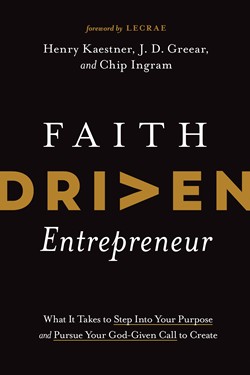When we stop pretending like we have everything under control and start showing others the truth, our lives become a walking witness to the God we worship.
By Henry Kaestner, adapted from the book Faith-Driven Entrepreneur: What It Takes to Step Into Your Purpose and Pursue Your God-Given Call to Create
We all want to appear like we have it all together. As entrepreneurs, we want our investors, employees, and customers to know that everything is under control. We can take care of everything. We can handle whatever comes our way.
The problem with this attitude is that it often involves us putting up a front. Trying to manipulate the way others perceive us is a slippery slope because eventually all we have is the false frame that others see with no concept of our actual self that lies within it. We can quickly become walking shells of humans with personalities we’ve merely created for ourselves.
But in Luke 18, Jesus paints an incredible picture of the difference between someone who manages their image and someone who is honest about who they are:

Photo credit: DocuSign
“To some who were confident of their own righteousness and looked down on everyone else, Jesus told this parable: “Two men went up to the temple to pray, one a Pharisee and the other a tax collector. The Pharisee stood by himself and prayed: ‘God, I thank you that I am not like other people—robbers, evildoers, adulterers—or even like this tax collector. I fast twice a week and give a tenth of all I get.’
“But the tax collector stood at a distance. He would not even look up to heaven, but beat his breast and said, ‘God, have mercy on me, a sinner.’
“I tell you that this man, rather than the other, went home justified before God. For all those who exalt themselves will be humbled, and those who humble themselves will be exalted.”
Luke 18:9-14, NIV

Photo credit: Redd
In this parable, we see the Pharisee trying to persuade God to perceive him in a certain light. He keeps the things he’s ashamed of to himself and comes to God with only the good—his fasting and tithing.
But for the tax collector, there’s no front. He knows that he’s a sinner, and he knows that God knows, so why try to hide it? All he asks for is mercy. He doesn’t try to curry favor, doesn’t try to bring blessing upon himself. He just wants grace. And as Jesus explains, it’s this heart posture of humility that leads to the man’s justification.
Entrepreneurs can very easily act like the Pharisee in this parable. We can present information—to our shareholders, our friends, our families—that serves as a means of self-justification. “I’m going to meet our next quarter goals.” “I’m going to make sure the job gets done.” “I’m going to be everywhere people need me to be.”
But here’s the truth: we can’t do it alone, and even if we could, it’s not about us anyway. God wants our honest hearts, not the facades we put up for others or the version of ourselves we’re most proud of. But to give him our honest hearts requires humility. And the terrifying truth is that if we don’t humble ourselves, God might do it for us. He has changed kings and altered kingdoms. If he needs to take away our business to remind us that he is God, that seems well within his reach.

Photo credit: Christina @ wocintechchat.com
When we stop pretending like we have everything under control and start showing others the truth, our lives become a walking witness to the God we worship. Why? Because even if the business is crumbling all around us, we can still point others to the eternal hope we have in Christ.
Ministering in deed isn’t acting like we have all the answers. It’s living our lives openly and honestly so that God can shine through our brokenness.
As leaders of businesses, entrepreneurs get to let everyone know where the team is going and the role they play in getting the team there. This sounds basic, and it is. But it’s very hard to do well.
We need to paint a picture of what success looks like so that the end goal becomes real to those around us—so real they can almost taste it. Or as author Madeleine L’Engle says, “We draw people to Christ not by loudly discrediting what they believe, by telling them how wrong they are and how right we are, but by showing them a light that is so lovely that they want with all their hearts to know the source of it.” Ministry in deed is the act of living a life that gives light to those who see you.
We talked about sharing our faith at work and what it looks like to praise God in every opportunity, but what we haven’t addressed is that our very existence is an incredible opportunity to share God’s love. The way we live can make the Good News of Jesus obvious and irresistible.
That means we’re more than just the messengers of God’s love. We’re the models of his good works. We share the love of God, and we show it in the way we live.

Photo credit: Leon
Jesus did this, right? He didn’t just preach and teach and talk about who God was. No, he showed it in the way he lived. He performed miracles, treated others kindly, and followed through on everything he had shared all the way up to dying for our sins. He modeled God’s love.
If you want to know what it looks like to successfully minister in deed, it means being the type of person who makes people stop and ask, “What makes them different?”
People who understand who God is and what he’s done act differently than people who don’t. There’s a different peace, a different assurance, a different attitude that follows those who believe in Jesus.
People who model God’s love are intention and integrity in action. They have an actual interest in others. They love their neighbor because they first care about their neighbor. That’s who God has placed us on earth to be.
While talking about your faith at work is great, evangelism doesn’t stop there. Sharing God’s love with others means showing God’s love to them in tangible ways that they can receive and understand. It means ministry in deed.
Featured image photo credit: Redd
You’ve been reading from
Faith Driven Entrepreneur by Henry Kaestner, J. D. Greear, and Chip Ingram
Entrepreneurship can be a lonely journey. But it doesn’t need to be. God has a purpose and a plan for all those entrepreneurial dreams and creative gifts he gave you.
The work you do today—the company you’ve built, the employees you work with, the customers you serve, the shareholders you report to, all of it—serves as an active part of what God wants to accomplish on earth.
You are not alone in this journey. Join other faith-driven entrepreneurs as, together, we
- identify the values, habits, and traits that empower us to successfully build businesses, serve our communities, and faithfully pursue a loving relationship with God;
- read stories that exemplify how those values, habits, and traits unfold in everyday life; and
- discover the potential God wants to unleash through our work.
Each book purchase includes access to the eight-session Faith Driven Entrepreneur video series, a discussion guide to encourage conversation among peers, and an invitation to join a Faith Driven Entrepreneur Group to meet other like-minded entrepreneurs.





